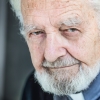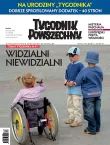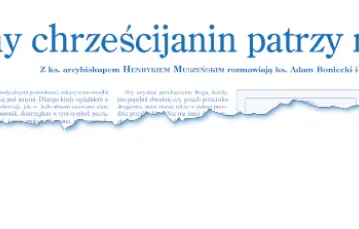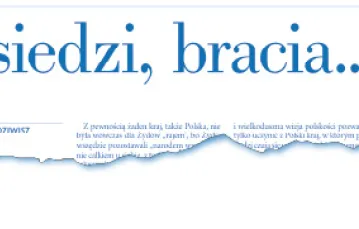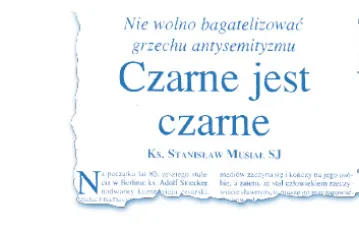Wykupienie dostępu pozwoli Ci czytać artykuły wysokiej jakości i wspierać niezależne dziennikarstwo w wymagających dla wydawców czasach. Rośnij z nami! Pełna oferta →
The service started at exactly 7 pm. The Primate of Poland presided in penitential purple robes, accompanied by the two cardinals: Franciszek Macharski and Henryk Gulbinowicz. Almost fifty bishops sat in the nave in two long lines - without
mitres and liturgical vestments, in black cassocks devoid of those red or purple belts, wearing crosses and zucchettos. The music (an organ improvisation on the Sanctus Deus theme), chants, the choice of texts, and the quiet atmosphere left one in no doubt that this was a penitential service.
Introduction [by Bishop Stanisław Gądecki - ed.]. Historical context, a reference to the papal penitential act “We forgive and ask forgiveness" and a clear message: “As pastors of the Church in Poland, we wish to stand in truth before God and people, and most of all before our brothers and sisters, referring with regret and remorse to the crime that was committed in July 1941 in Jedwabne and elsewhere. Its victims were Jews and its perpetrators included Poles and Catholics, people who were baptised..." The introduction ends with the following words: “Striving for reconciliation with God and people, we wish to begin the new century with even greater faith and trust... We hope that Katyń and Auschwitz, Kołyma and the death camps, and Jedwabne, will never happen again."
The Primate’s prayer “Lord, enlighten our minds so that we may learn the evil that has been done and can beg your forgiveness for it. Let your love unite all who have been separated by sin..."
Readings from the Bible. First - Cain’s crime: “And He said, ‘What have you done? The voice of your brother’s blood cries out to Me from the ground’," and then from St. John: “If we claim to be without sin, we deceive ourselves and the truth is not in us. If we confess our sins, He... will forgive us our sins and purify us from all unrighteousness." The Parable of the Good Samaritan. No commentary, no sermon. After the readings, a long silence. The only commentary is the psalmody between lessons - Psalm 51. Well-known words take on a new meaning, “Save me from bloodguilt, O God... Create in me a pure heart, O God..."
Then everyone - the cardinals, the bishops, and the faithful fall to their knees: “Lord, we lay our guilt before Thine eyes..." - an old, heart-rending penitential hymn composed by Pope Urban VIII in the mid-17th century.
The Primate intones the Prayer of the Faithful. Intercessions are presented by Archbishop Michalik, Cardinal Macharski, Cardinal Gulbinowicz, Bishop Libera, Archbishop Gocłowski, Bishop Dydycz, Bishop Skworc, Bishop Lepa, and Bishop Suski.
Finally, to mark our commitment, we - the Primate, cardinals, bishops and all present - stand and approach the image of the Crucified Jew before the altar to kiss His wounds with veneration.
This penitential service had, above all, a prophetic dimension. It was a prophetic gesture against incomprehension and resentment. It was the voice of the Church and not just of one or a few bishops. The Primate and the bishops prayed with the words and read the words composed by the Episcopate, which had been born of earlier and profound religious meditation.
Suddenly a voice came... Will it be heard? Will it be accepted? As I drove back to Kraków that night, I listented to the radio news. The first news item on every radio station was invariably the service at the All Saints’ Church, with one exception. Radio Maryja, which in the morning had presented an excellent report on the tenth anniversary celebrations of the re-establishment of the Church in Russia, did not once mention the event in Warsaw.
This is the voice of one crying in the wilderness: make his paths straight...
Tygodnik Powszechny No 22/01

